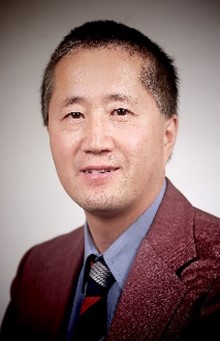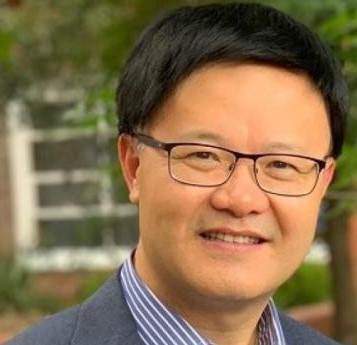
Peng Shi
School of Electrical and Mechanical Engineering
University of Adelaide, Australia
Peng.shi@adelaide.edu.au
Abstract: Artificial intelligence (AI) is now one of the most popular and fundamental areas, and has found its practical applications in many fields, such as autonomous and robotic systems, manufacturing systems, cyber-physical systems, communication systems, image and pattern recognitions, etc. AI has been extensively studied in the past decades. There is no doubt that AI has been and will continue playing a big role in our daily life and real world applications. This talk will present some challenges facing to AI, and issues in cybersecurity.
 Peng Shi received the PhD degree in Electrical Engineering from the University of Newcastle, Australia in 1994. He was awarded the higher doctorate -- the Doctor of Science degree from the University of Glamorgan, UK in 2006, and the Doctor of Engineering degree from the University of Adelaide, Australia in 2015. He is now a Distinguished Professor at the School of Electrical and Mechanical Engineering, and the Director of Advanced Unmanned Systems Laboratory, at The University of Adelaide, Australia. His research interests include systems and control theory and applications to autonomous and robotic systems, cyber-physical systems, and multi-agent systems. He received the Life-time Achievement Award from the International Engineering and Technology Institute in 2023, the Meritorious Service Award from IEEE Systems, Man and Cybernetics (SMC) Society in 2023, the MA Sargent Medal Award from Engineers Australia in 2022; the Life-time Achiever Leaderboard and Field Leader Recognition from The AUSTRALIAN Research Review from 2019-2023, and the Highly Cited Researcher Acknowledgement from Clarivate Analystics 2014-2023. Currently he serves as the Editor-in-Chief of IEEE Transactions on Cybernetics, a Senior Editor of IEEE Access, and an associate editor for several journals, including Information Sciences, IEEE Transactions on Artificial Intelligence and Automatica. His professional services also include as the President of the International Academy for Systems and Cybernetic Sciences (2021--), the Vice President of IEEE SMC Society (2021-2022), and IEEE SMC Society Distinguished Lecturer (2020--). He is a Fellow of IEEE, IET, IETI, IEAust, CAA, and a Member of the Academy of Europe.
Peng Shi received the PhD degree in Electrical Engineering from the University of Newcastle, Australia in 1994. He was awarded the higher doctorate -- the Doctor of Science degree from the University of Glamorgan, UK in 2006, and the Doctor of Engineering degree from the University of Adelaide, Australia in 2015. He is now a Distinguished Professor at the School of Electrical and Mechanical Engineering, and the Director of Advanced Unmanned Systems Laboratory, at The University of Adelaide, Australia. His research interests include systems and control theory and applications to autonomous and robotic systems, cyber-physical systems, and multi-agent systems. He received the Life-time Achievement Award from the International Engineering and Technology Institute in 2023, the Meritorious Service Award from IEEE Systems, Man and Cybernetics (SMC) Society in 2023, the MA Sargent Medal Award from Engineers Australia in 2022; the Life-time Achiever Leaderboard and Field Leader Recognition from The AUSTRALIAN Research Review from 2019-2023, and the Highly Cited Researcher Acknowledgement from Clarivate Analystics 2014-2023. Currently he serves as the Editor-in-Chief of IEEE Transactions on Cybernetics, a Senior Editor of IEEE Access, and an associate editor for several journals, including Information Sciences, IEEE Transactions on Artificial Intelligence and Automatica. His professional services also include as the President of the International Academy for Systems and Cybernetic Sciences (2021--), the Vice President of IEEE SMC Society (2021-2022), and IEEE SMC Society Distinguished Lecturer (2020--). He is a Fellow of IEEE, IET, IETI, IEAust, CAA, and a Member of the Academy of Europe.
Hua Wang
Institute for Sustainable Industries and Liveable Cities (ISILC)
Victoria University, Australia
Abstract: Data anonymization is a fundamental and practical privacy preserving data publication (PPDP) method, while searching for the optimal anonymization scheme using traditional methods has been proven to be NP-hard. Some recent studies have introduced genetic algorithms (GA) into data anonymization to address this issue, revealing potential solutions. However, the discussions are restricted to a few privacy protection models and evolutionary algorithms (EAs). This talk extends this field by introducing differential evolution (DE) for the first time to optimize data anonymization schemes under the constraints of the t-closeness privacy model. To further enhance the algorithm’s performance, we design a two-layer evolutionary framework (TLEF) that effectively explores optimal solutions by leveraging the unique properties of both GA and DE in a balanced manner. Experimental evaluations conducted on 16 test datasets highlight the advantages of DE in addressing optimal t-closeness anonymization and validate the effectiveness of the TLEF.
 Hua Wang is now a full time professor in the Institute for Sustainable Industries and Liveable Cities (ISILC) at Victoria University. Hua carries out research on machine learning and data analysis, with a particular focus on data mining, artificial intelligence, deep learning, big data, privacy preserving, access control and cyber security. As a Chief Investigator, Hua has successfully received ten large Australian Research Council (ARC) grants including seven discovery grants and three linkage grants with AU$6.0M since 2006. He is also a successor for international grants such as two grants from Japan Society for the Promotion of Science (JSPS), one German–Australian grant (DAAD), one Norwegian government grant, three grants from Hong Kong and two from China.
Hua Wang is now a full time professor in the Institute for Sustainable Industries and Liveable Cities (ISILC) at Victoria University. Hua carries out research on machine learning and data analysis, with a particular focus on data mining, artificial intelligence, deep learning, big data, privacy preserving, access control and cyber security. As a Chief Investigator, Hua has successfully received ten large Australian Research Council (ARC) grants including seven discovery grants and three linkage grants with AU$6.0M since 2006. He is also a successor for international grants such as two grants from Japan Society for the Promotion of Science (JSPS), one German–Australian grant (DAAD), one Norwegian government grant, three grants from Hong Kong and two from China.
Hua has published 400 refereed scholar papers with 12000+ citations, including 81 Q1 (ERA2018 ranked) Journal papers in machine learning, cyber security, Artificial Intelligence, privacy preserving and data analysis. Representative publications are on:
- ACM Transactions on Internet Technology
- ACM Transactions on Information Systems
- ACM Transactions on Knowledge Discovery from Data
- IEEE Transactions on Dependable and Secure Computing
- IEEE Transactions on Knowledge and Data Engineering
- IEEE Transactions on Automation Science and Engineering
- IEEE Transactions on Evolutionary Computation
- IEEE Transactions on Services Computing
- Proceedings of ACL, AAAI, CIKM, ICDE, ICDM and PAKDD
Hua's h-index is 65 based on Google Scholar website. As a principal supervisor, he currently has 14 PhD students at VU.
Hua has been appointed as a College of Expert by the ARC since 2021, and has already been an ARC reviewer since 2009. He reviews various proposals each year for ARC DP, LP, DECRA, LIEF. Hua is Editor-in-Chief, Featured Journals, European Alliance for Innovation (EAI) Transactions on Scalable Information Systems, and also editor for PLOS ONE and World Wide Web Journal, Springer. He is involved in many prestigious international conferences such as PC members (ICDE2022-24, AAAI2019, IJCAR2022, 23) and chairs for the International Conference on Web Information Systems Engineering (WISE) 2015-2018.
Hua is the discipline leader of technology in engineering and science at VU, and a director of Oceania Cyber Security Centre (OCSC) consisting of eight Victorian universities with substantial support from the Victorian government, with engagement of industry. He is working as a committee member for:
- IEEE Blockchain Standards group
- IEEE COMSOC Project 1912 Privacy and Security Architecture for Consumer Wireless Devices Working Group
- Japan Society for the Promotion of Science Alumni Association in Australia (JSPSAAA)
- Data61 University Planning Committee.
Hua is served as lots of professional editors such as:
- Editor of IEEE Transactions of Cybernetic;
- Editor of IEEE Transactions of on Technology and Society;
- Editor-in-Chief of EAI Endorsed Transactions on Scalable Information Systems.
